We live in a world of one-click purchases, instant communication, and on-demand everything. The conveniences of the digital age are undeniable—but they come with a cost. Just as you’d never leave your front door wide open at night, you shouldn’t leave your digital life unguarded. The online world can be a playground for cyber criminals, and if you’re not careful, your personal information, bank accounts, and even your identity can be stolen in a matter of seconds.
From phishing scams to data breaches, cyber threats are more sophisticated—and common—than ever. Fortunately, you don’t need to be a tech wizard to protect yourself. With a few proactive steps, you can build a solid defense against digital dangers.
Here’s how to keep your information safe in the connected world.
1. Use Strong, Unique Passwords
It may seem obvious, but many people still rely on simple, reused passwords across multiple accounts. If one of those sites is breached, all your linked accounts could be compromised. Instead:
- Create long passwords using a mix of letters, numbers, and special characters.
- Don’t use personal info (like your pet’s name or birthdate).
- Use a password manager to generate and store secure passwords—it’s safer and easier than trying to remember them all.
2. Turn On Two-Factor Authentication (2FA)
Two-factor authentication adds an extra layer of protection by requiring a second form of verification (such as a code sent to your phone) in addition to your password. It’s a simple step that drastically reduces the chances of someone gaining unauthorized access to your accounts—even if they have your password.
Enable 2FA wherever it’s offered, especially on email, social media, and financial platforms.
3. Watch Out for Phishing Scams
Phishing emails or texts are designed to trick you into revealing personal information or clicking malicious links. These messages often appear to be from trusted sources—your bank, a delivery service, or even your boss.
To avoid falling for them:
- Don’t click on links or download attachments from unknown or unexpected senders.
- Hover over links to see where they really lead.
- If something feels off, trust your instincts—go directly to the official website instead of clicking a suspicious link.
4. Keep Your Software Updated
Your device’s software isn’t just updated to fix bugs or add new features—updates often patch security holes that hackers could exploit. Make sure you:
- Enable automatic updates on your phone, computer, and apps.
- Update your antivirus software regularly.
- Don’t ignore update prompts—delaying could leave your system vulnerable.
5. Avoid Public Wi-Fi for Sensitive Transactions
Public Wi-Fi is convenient but not secure. Hackers can intercept data on open networks, making it easy for them to snoop on your activity.
If you must use public Wi-Fi:
- Avoid logging into bank accounts or making purchases.
- Use a Virtual Private Network (VPN) to encrypt your connection and shield your data from prying eyes.
6. Monitor Your Accounts Regularly
The sooner you spot suspicious activity, the better. Make a habit of:
- Checking bank statements and credit card transactions regularly.
- Setting up transaction alerts for large purchases or unusual activity.
- Reviewing your credit report at least once a year (you’re entitled to a free copy from each of the major credit bureaus).
7. Be Mindful of What You Share Online
Oversharing on social media can give hackers valuable clues about your life. Posting your vacation plans, full birthdate, or even your mother’s maiden name can unintentionally help someone guess your passwords or answer your security questions.
Keep your profiles private, and think twice before sharing personal information.
8. Back Up Your Data
Even with strong defenses, breaches and ransomware attacks happen. Regularly backing up your data ensures you won’t lose important files if your device is compromised.
Use:
- Cloud services for automatic backups.
- An external hard drive for secure offline copies.
Make sure your backup strategy includes frequent updates and multiple copies.
Conclusion: Stay Alert, Stay Secure
The digital world is a place of opportunity—but it’s also a place where threats lurk in the shadows. The good news? You don’t need to live in fear. With some awareness and a few smart habits, you can protect yourself and stay a step ahead of hackers.
Think of your digital security like locking your home at night—it’s a basic necessity. The same way you wouldn’t leave your doors unlocked, you shouldn’t leave your data exposed. Take control of your online safety today, and enjoy the benefits of the digital age with greater peace of mind.
Let me know if you’d like a checklist for online security or a guide to setting up a VPN.




